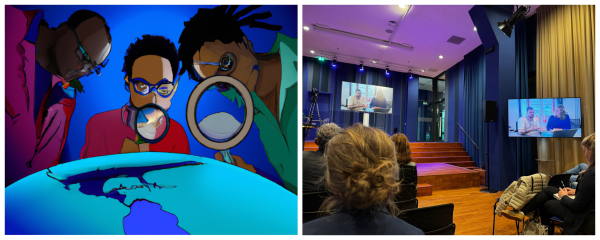 The publication of a new study, Mapping Caribbean Researchers, reveals a vibrant yet often overlooked community of researchers and knowledge professionals connected to the six islands of the Caribbean part of the Kingdom: Aruba, Bonaire, Curaçao, Sint Maarten, Saba, and Sint Eustatius.
The publication of a new study, Mapping Caribbean Researchers, reveals a vibrant yet often overlooked community of researchers and knowledge professionals connected to the six islands of the Caribbean part of the Kingdom: Aruba, Bonaire, Curaçao, Sint Maarten, Saba, and Sint Eustatius.
The study, conducted by local researchers Renske Pin and Steffen van Heijningen with financial support from the Ministry of the Interior and Kingdom Relations (BZK), shows that the region represents a true treasure chest of researchers and academic knowledge. This knowledge community is not limited to the islands themselves but extends into a broad and active diaspora.
Nearly 400 researchers participated in the online survey. The topics and content of the questionnaire were co-defined through focus group sessions with more than 70 local academics and knowledge professionals, who jointly identified the main themes relevant for strengthening and making visible the Caribbean research community.
The findings reveal a large, diverse, and highly educated field. No less than 38% of respondents hold a PhD, 13% are currently pursuing one, and another 22% intend to start a PhD trajectory. The community includes not only university-based researchers but also independent scholars, visiting academics, and members of the Caribbean diaspora who remain actively engaged with the islands.
The results highlight a community with high geographical mobility, multilingualism, and cultural diversity. Researchers often work across islands and borders, maintain close ties with both the Netherlands and the Caribbean region, and cover a wide range of disciplines—from social development, culture, and education to health, governance, and the environment. Much of their work is practice-oriented and socially impactful.
At the same time, the study identifies several structural challenges that constrain the continuity and impact of research, such as limited access to funding, data, and institutional support, insecure employment and income conditions (low income levels, with only 50% having a pension plan), high travel and logistics costs, and barriers to building sustainable collaborations.
The researchers therefore advocate for a Caribbean Researchers Portal—a digital platform that improves the visibility and accessibility of researchers and their work, facilitates collaboration, and strengthens the Caribbean knowledge ecosystem.
Pin and Van Heijningen express their sincere gratitude to the Ministry of the Interior and Kingdom Relations for the financial support of this special project, which contributes to strengthening knowledge about and within the Kingdom. According to the researchers, such knowledge is not only important for the islands themselves, but also for the quality of policymaking within the Kingdom. “We found an incredible reservoir of expertise—highly educated, internationally oriented researchers deeply rooted in their communities. With modest but targeted investments in coordination, funding, and digital infrastructure, this ecosystem could make an even greater contribution to policy and knowledge development across the Kingdom,” the researchers note.
The report concludes that strengthening local and regional knowledge infrastructures is essential for an inclusive and sustainable future. Read the summary and results at: www.tinyurl.com/ReportMappingCaribResearchers












